Overview
The article underscores the significance of billing programs for small businesses in 2025, addressing common concerns freelancers face regarding expense management. These tools are essential for enhancing efficiency and accuracy in invoicing and payment processes. It provides clear, factual information about various software options such as:
- FreshBooks
- QuickBooks
- Zoho Invoice
Furthermore, it emphasizes the transformative impact of automation on financial management, which enables small business owners to save time and improve cash flow management. This means that integrating these billing solutions can lead to more streamlined operations and better financial oversight. As you consider your own experience with expense management, reflect on how these tools could simplify your processes. The article invites you to explore these options further and discover how they can benefit your business.
Introduction
In the dynamic world of small business, the right billing software can significantly impact whether an enterprise thrives or merely survives. As small business owners navigate the complexities of invoicing and payment collection, the demand for efficient, automated solutions has surged. With 2025 showcasing a diverse array of billing programs—from user-friendly options like FreshBooks to comprehensive platforms such as QuickBooks, along with the innovative features of Kulud—owners face a crucial decision.
This article explores the essential aspects of billing software, examining its impact on operational efficiency, the importance of selecting the right solution, and the transformative role of automation in modern financial management. Furthermore, as the landscape continues to evolve, understanding these tools is vital for entrepreneurs aiming to streamline their processes and focus on growth.
Overview of Billing Programs for Small Businesses
Billing programs for small businesses are essential tools that simplify the invoicing and payment collection processes, designed specifically to address the unique requirements of small organizations. These programs not only enhance efficiency but also improve accuracy in financial transactions, allowing owners to focus on growth rather than administrative burdens. In 2025, the landscape of invoicing software has evolved significantly, with options ranging from basic invoicing solutions to comprehensive accounting platforms.
Current statistics reveal that nearly half of small and medium-sized enterprises still rely on paper records, despite the availability of advanced document management systems. This reliance highlights a critical opportunity for enhancement through the adoption of digital invoicing solutions like Kulud. As companies increasingly acknowledge the significance of shifting to automated systems, the need for efficient invoicing software continues to grow.
Prominent examples of billing software include:
- FreshBooks
- QuickBooks
- Zoho Invoice
Each offering distinct functionalities that cater to various aspects of billing and financial management. FreshBooks is recognized for its user-friendly interface and robust invoicing features, making it ideal for freelancers and independent entrepreneurs. QuickBooks, on the other hand, provides a comprehensive suite of accounting tools that integrate seamlessly with other financial processes.
Zoho Invoice stands out for its affordability and customizable features, appealing to startups and minor enterprises.
The effect of billing programs for small businesses on their efficiency cannot be overstated. By automating invoicing and payment collection, businesses can drastically reduce the time spent on accounting tasks—from hours to just minutes. As Georgi Knyazhev noted, "The system has transformed accounting processes, allowing users to save time and streamline communication with their accountants."
Kulud's features, such as automated invoice matching, bank transaction integration, and the ability to easily request missing invoices or follow step-by-step instructions to retrieve them from apps, enable effortless expense management. This allows freelancers to centralize their financial data and collaborate effectively with accountants and bookkeepers. This efficiency not only saves time but also enhances cash flow management, allowing companies to maintain accurate financial records effortlessly.
Expert opinions highlight the essential function of billing programs for small businesses in the operational success of minor enterprises. As the market continues to evolve, the implementation of these tools is becoming increasingly vital for organizations aiming to thrive in a competitive landscape. Successful case studies demonstrate how minor enterprises that have adopted billing programs for small businesses report enhanced communication with accountants and a substantial decrease in administrative tasks, ultimately resulting in better financial health and growth potential.
Moreover, with just 70% of minor enterprises possessing a website, the incorporation of digital tools such as invoicing software is crucial for contemporary operational activities.
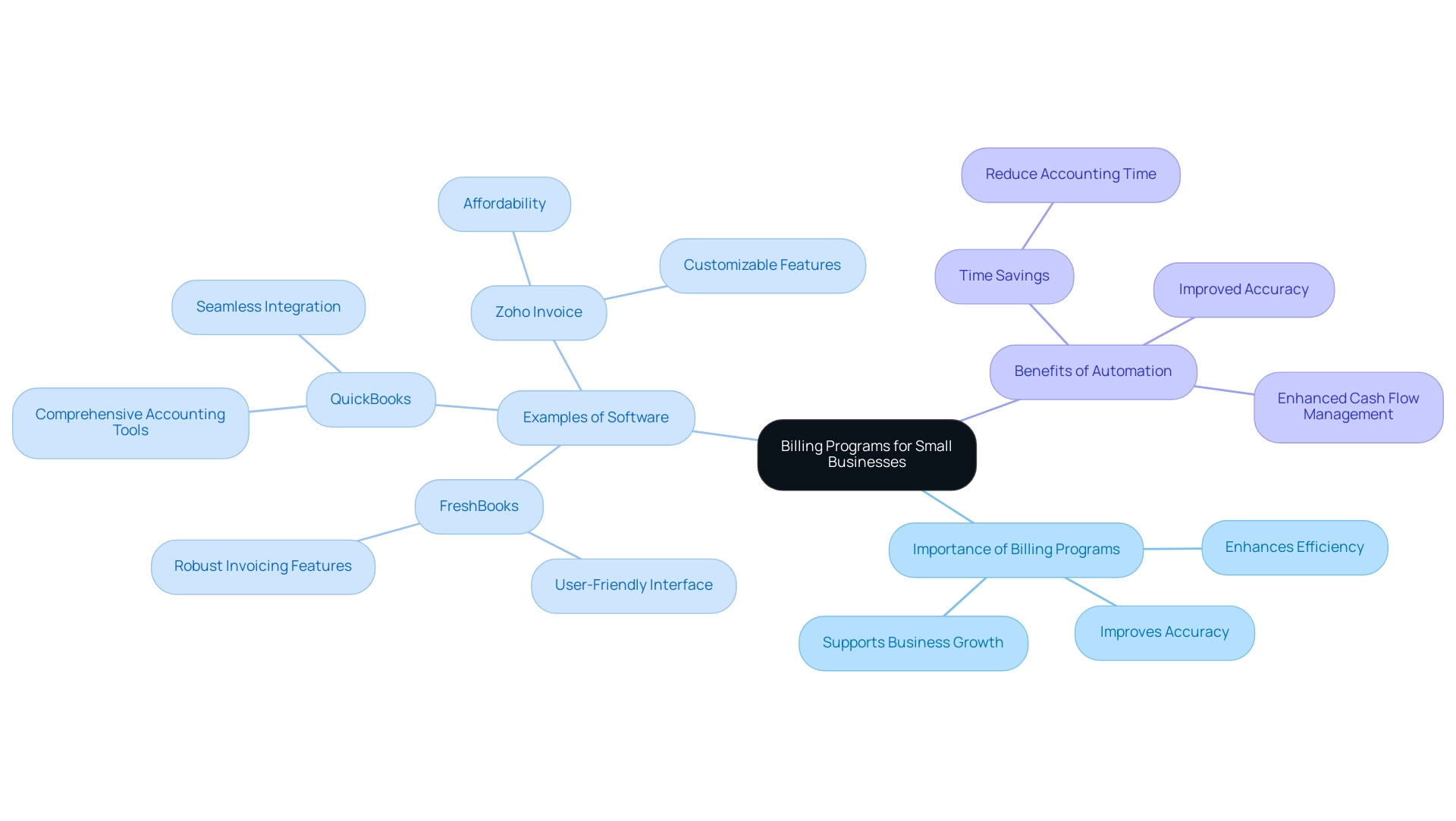
Why Choosing the Right Billing Software Matters
Selecting the appropriate billing programs for small businesses is essential, as it significantly influences their financial operations. Effective billing solutions, such as this service, automate invoicing, track payments, and generate crucial financial reports—each vital for maintaining healthy cash flow and ensuring timely payments. Kulud can identify emails containing receipts, attached receipts, or links to receipts, saving users hours of manual searching.
In contrast, inadequate software can lead to inefficiencies, increased errors, and potential revenue loss. Statistics indicate that financial management errors due to inappropriate software choices can result in substantial setbacks for companies.
When assessing billing programs for small businesses, owners should prioritize factors such as:
- User-friendliness
- Integration capabilities with existing systems
- Quality of customer support
A well-chosen invoicing solution not only simplifies administrative tasks but also enhances the overall financial management process, enabling companies to focus on growth and strategic decision-making. For instance, companies with accurate financial reporting are 70% more likely to make effective strategic decisions, underscoring the importance of robust accounting practices.
As the landscape of financial management evolves—particularly with the rise of ePayments, projected to account for 62% of all enterprise payments in 2024—small businesses must adapt by selecting billing programs that align with their operational needs. This evolution is crucial, especially given that minor enterprise credit card balances have risen by 18% since 2019, emphasizing the financial pressures these enterprises face.
Moreover, 61% of small business owners express satisfaction with their accountant's advisory services, indicating a need for billing programs that can enhance financial management tools complementing these services. By making informed decisions, they can mitigate risks associated with financial mismanagement and position themselves for sustainable success. As Georgi Knyazhev noted, "This system has transformed my accounting processes, allowing me to save time and streamline communication with my accountants."
This sentiment is echoed by many users, including Emily J., a tax consultant, who states, "This platform has transformed how I work with clients." She adds, "I dedicate less time to administrative tasks and more time enhancing their enterprises."
The platform also enables users to quickly create a spreadsheet with all essential financial details, assisting organizations in avoiding missed tax filing deadlines and ensuring individuals don't neglect valuable deductions. Such testimonials demonstrate the transformative effect that efficient invoicing software, like Kulud, can have on small enterprise operations and billing programs, enhancing efficiency and promoting better collaboration with accountants.

Essential Features of Effective Billing Software
To enhance performance for small enterprises, it is essential that efficient billing programs incorporate a variety of crucial characteristics. Key functionalities of these programs include:
- Automated invoicing, which streamlines the payment process and reduces manual errors.
- Customizable invoice templates that enable companies to maintain brand consistency.
- Payment tracking, allowing users to monitor outstanding invoices and manage cash flow effectively.
Furthermore, integration with accounting software is vital, as it ensures seamless data transfer and minimizes the risk of discrepancies. Kulud excels in this area by allowing users to connect their bank accounts, automatically matching invoices with transactions, and easily exporting data to their accounting software or sharing it with accountants. In addition to this, features such as recurring billing cater to companies with subscription models, while expense tracking provides insights into spending patterns, aiding in budget management.
Real-time reporting capabilities further enhance financial oversight, enabling owners to make informed decisions based on up-to-date data.
In 2025, the demand for billing programs has only risen, with minor enterprises prioritizing software that meets their urgent needs and supports scalability. A recent analysis highlighted that the most requested features among small businesses, such as automated reminders for overdue payments and mobile accessibility, are integral to effective billing programs, reflecting the growing trend towards remote work and digital management solutions.
Case studies reveal that platforms focusing on automation and user-friendly design have transformed the accounting processes for many users, significantly reducing the time spent on bookkeeping tasks. As Georgi Knyazhev observed, the entity has had a 'transformative impact on their accounting processes, allowing them to save time and streamline communication with their accountants.' This change enables minor enterprise owners to focus on expansion instead of administrative responsibilities, making the choice of efficient invoicing software a vital decision for long-term success.
Kulud also offers affordable pricing plans that balance essential features with budget management, ensuring that users receive necessary functionalities while managing their budgets effectively. In contrast, Invoicely is a complimentary invoicing software service accessible exclusively on Windows, while Zoho functions as an all-in-one application appropriate for medium-sized enterprises, recognized for its invoice and payment features. A comprehensive guide examined the top 16 invoicing and payment software options in 2025, emphasizing the importance of selecting the appropriate invoicing app based on specific needs and budget.
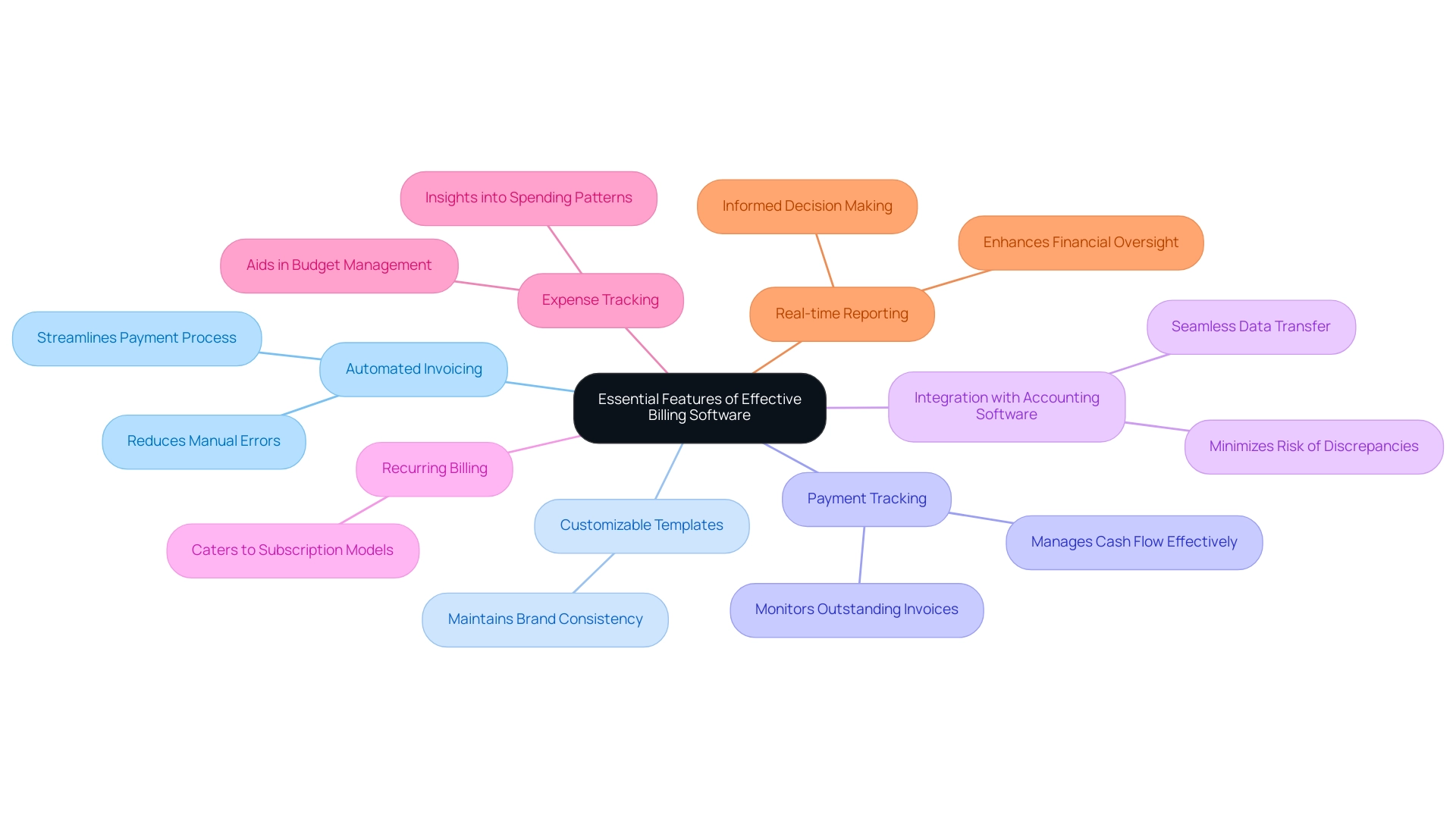
Top Billing Software Solutions for Small Businesses in 2025
In 2025, the landscape of billing programs for small businesses includes several standout software solutions that address the varied needs of freelancers and small enterprises. One company emerges as a key player, offering innovative expense management features that automate the process of finding, extracting, and categorizing receipts and invoices. With seamless business email login and Gmail integration, the platform simplifies the expense management process, allowing freelancers to focus on growing their businesses rather than getting bogged down in bookkeeping tasks.
The automated extraction capabilities of this system further enhance this process, ensuring that users can efficiently manage their financial documentation. User testimonials emphasize how the automated expense management system transforms bookkeeping from hours to mere minutes, making it an essential tool for freelancers. Additionally, the platform allows users to request missing invoices and automate bank transaction matching, centralizing financial data for a streamlined experience.
While FreshBooks continues to be a favorite for its intuitive user interface and powerful invoicing capabilities, and QuickBooks Online distinguishes itself with a comprehensive suite of accounting features, the focus here remains on Kulud's unique offerings. Zoho Invoice has garnered attention for its affordability and robust automation features, appealing to budget-conscious companies looking to streamline their invoicing without sacrificing quality. Moreover, Xero shines with its exceptional integration capabilities, allowing users to connect seamlessly with various third-party applications, enhancing overall functionality.
Invoice Ninja is also remarkable, acknowledged for its adaptability and customization choices, allowing enterprises to adjust their invoicing processes to suit their specific needs.
User satisfaction ratings reflect the strengths of these platforms, with FreshBooks, QuickBooks, and Zoho Invoice consistently receiving positive feedback for their ease of use and effectiveness. Case studies reveal that companies utilizing FreshBooks have reported significant time savings in invoicing, while QuickBooks users appreciate the comprehensive financial oversight it provides. Zoho Invoice users highlight its automation features as a game-changer in reducing manual entry and errors.
As minor enterprise owners assess their options, the selection among these leading invoicing software solutions will mainly rely on their particular needs, whether it be user-friendliness, comprehensive accounting features, affordability, or customization capabilities. Steve Bennett, a Business Formation Expert, emphasizes the importance of tailored solutions for enterprises, stating that "Steve’s passion for helping organizations grow makes LLCBuddy a go-to resource for starting and managing an LLC." This viewpoint aligns with the needs of freelancers and small enterprises seeking effective billing programs for small businesses.
Moreover, with 95% of companies claiming to be customer-focused but only 50% tailoring their products and services to client needs, the emphasis on user-centric design in billing programs for small businesses is crucial. Kulud's features, such as the ability to request missing invoices and automate bank transaction matching, further enhance its appeal. This diverse range of offerings ensures that freelancers and entrepreneurs can find a solution that aligns perfectly with their operational requirements.
Furthermore, for companies that offer tangible products, the case study on inventory-based invoicing software demonstrates the particular requirements that may emerge, further emphasizing the significance of choosing the appropriate payment solution.
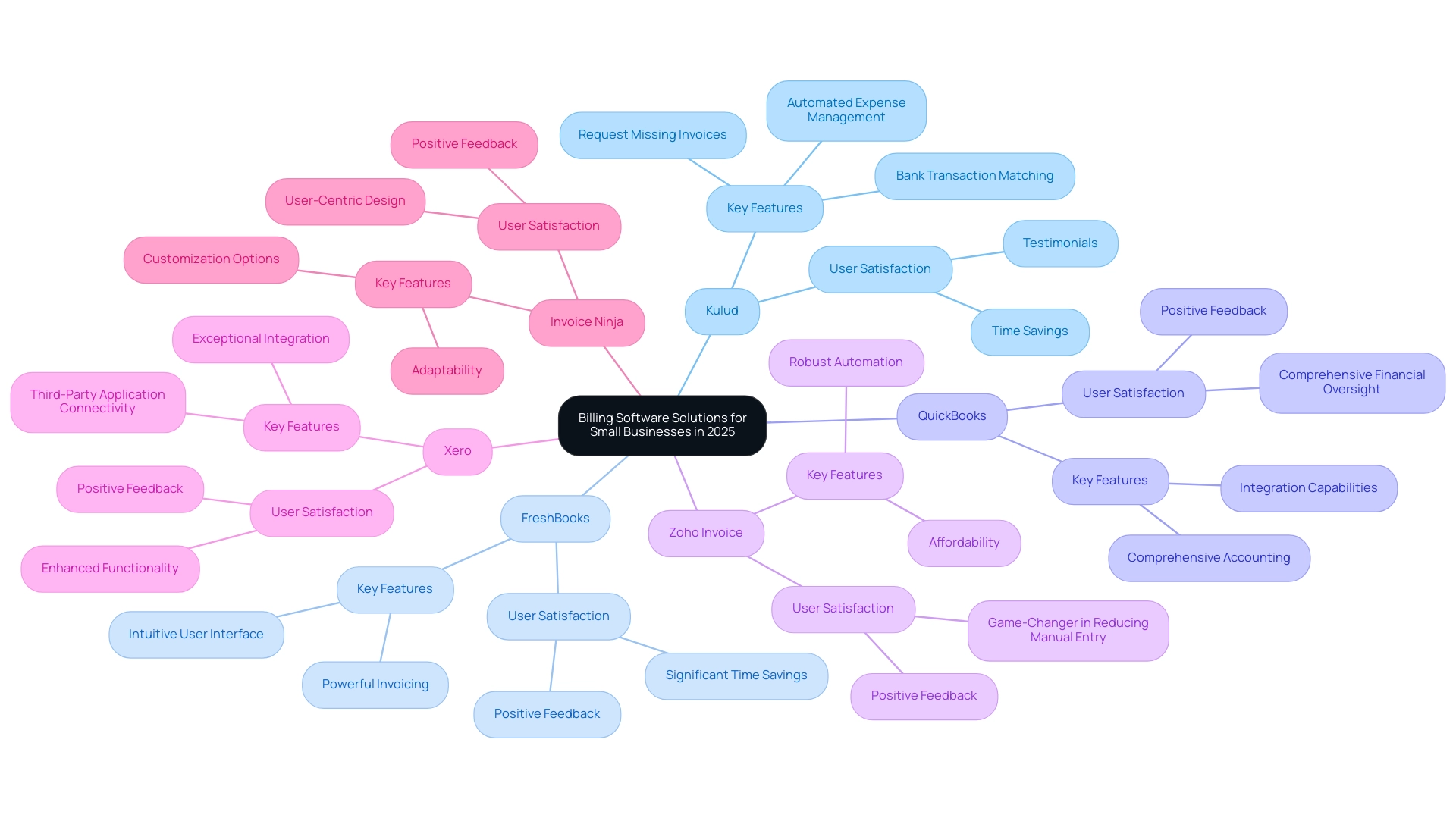
Tailored Billing Solutions for Freelancers and Small Business Owners
Freelancers and small business owners often encounter unique challenges in managing their invoicing processes. These challenges can be alleviated by implementing tailored billing programs for small businesses, which reduce inefficiencies that detract from their core activities. Customized invoicing options, such as this service, are specifically designed for this demographic, providing features that streamline the payment experience. The platform centralizes invoices, receipts, and transactions, enabling users to automate invoice collection and reconciliation, thereby simplifying financial management.
Key functionalities include:
- Intuitive invoice creation
- Comprehensive expense tracking
- Robust client management tools
- Capability to generate spreadsheets for tax preparation
These features are essential for maintaining financial health.
Mobile applications represent a significant advantage of these platforms, allowing users to manage their finances on the go. This flexibility is crucial, especially considering that 97% of smartphone users utilize AI-powered voice assistants, which can further streamline tasks through voice commands. Additionally, 41% of individuals use the voice search feature at least once a day, underscoring the growing reliance on voice technology for efficient task management.
Many of these invoicing solutions, including Kulud, integrate seamlessly with payment processors, facilitating efficient payment collection and reducing the time spent on administrative tasks.
Statistics reveal that freelancers face considerable invoicing challenges, with a substantial portion reporting difficulties in tracking expenses and managing invoices. In low-income economies, where approximately 80% of the workforce engages in freelance work, the need for effective invoicing solutions is even more pronounced. By selecting billing programs for small businesses that cater to their specific needs, freelancers can significantly streamline their billing processes, enabling them to dedicate more time to growing their enterprises.
As Georgi Knyazhev states, "The software has transformed my accounting processes, allowing me to save time and streamline communication with my accountants."
The organization has successfully completed a Cloud Application Security Assessment (CASA) and has been validated by the App Defense Alliance (ADA), ensuring a high level of security for users. This assessment includes a review of application conformance with CASA-recognized security frameworks, verification of automated security test (AST) application scan results, and conformity to non-functional CASA requirements.
Expert opinions highlight the importance of these tailored billing programs for small businesses. They not only enhance operational efficiency but also contribute to overall job satisfaction. With the average annual income for minor enterprise proprietors in the US at $62,083 and 75% indicating contentment with their work, efficient invoicing software can play a crucial role in achieving these outcomes. Kulud offers tiered pricing options, starting with a trial for 20 invoices and receipts for processing, making it accessible for freelancers and independent entrepreneurs.
By utilizing the appropriate tools, freelancers and independent entrepreneurs can confidently address their specific invoicing challenges with simplicity.
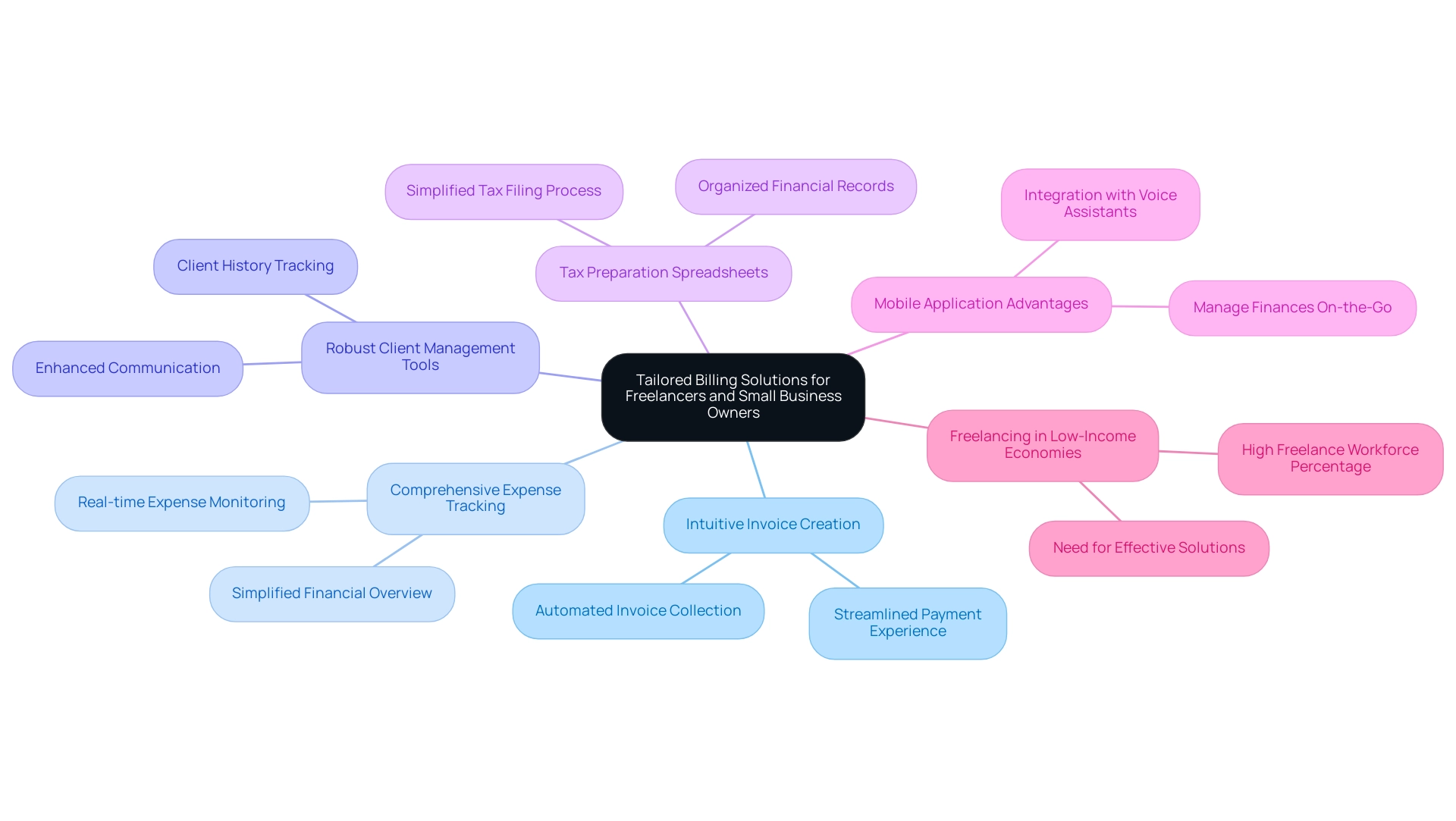
The Role of Automation in Modern Billing Software
Automation stands as a cornerstone of contemporary billing programs for small businesses, driving significant enhancements in efficiency for small enterprises in 2025. By automating invoicing procedures, companies can eliminate manual data entry, which not only reduces the likelihood of errors but also ensures that invoicing is timely and accurate. Features such as automatic payment reminders, recurring billing options, and the capability to match invoices with bank transactions further streamline operations.
This means that owners can dedicate more time to growth rather than administrative tasks.
The impact of automation extends beyond merely reducing errors; it also enhances financial oversight. Automated systems provide real-time insights into cash flow and outstanding invoices, enabling entrepreneurs to make informed financial decisions. Indeed, statistics indicate that 94% of corporate professionals prefer unified automation platforms for their financial operations, underscoring the demand for integrated solutions that simplify invoicing processes.
Furthermore, Kulud's collaborative features facilitate seamless collaboration between freelancers and enterprises, allowing them to share invoices and financial data effortlessly. This partnership is essential for maintaining transparency and ensuring that all parties are aligned on financial matters.
Real-world examples illustrate the advantages of billing programs for small businesses, particularly through automated invoicing. Businesses employing these programs, which include functionalities for matching bank transactions and exporting data to accounting software, have reported not only increased operational efficiency but also enhanced customer satisfaction, as clients appreciate the reliability and speed of automated payment systems. The ability to transfer data to accounting applications further enhances the utility of Kulud, streamlining financial management for enterprises comprehensively.
Additionally, the reduction in manual errors from automated invoicing is crucial for small enterprises in 2025, as it directly impacts their financial accuracy and operational efficiency. As the landscape of financial management continues to evolve, the role of automation in invoicing software remains vital for small businesses striving to thrive in a competitive environment.
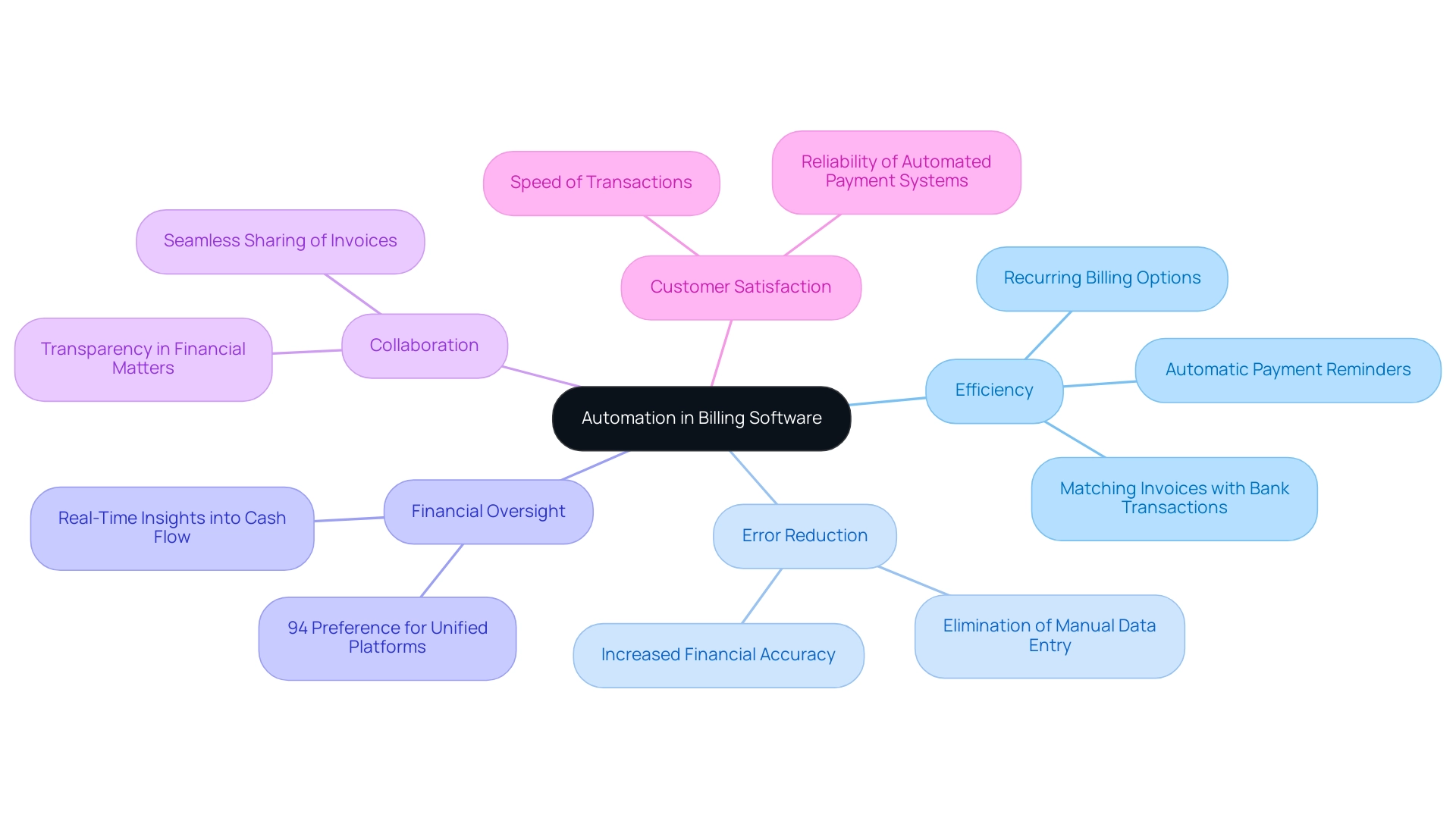
Comparative Pricing of Top Billing Software Options
The pricing landscape for invoicing software is diverse, reflecting the varying features and service levels offered by different platforms. Typically, solutions adopt tiered pricing models, with basic plans starting between $12 and $30 per month. More advanced packages can range from $50 to $200 per month, catering to organizations with more complex needs.
For example, FreshBooks offers a basic plan priced at $15 per month, while QuickBooks Online begins at $25 per month. Additionally, platforms like Zoho Invoice attract startups and freelancers by providing free plans with limited features.
In 2025, the typical expense of billing programs for small businesses is anticipated to correspond with these ranges, making it crucial for owners to thoroughly assess their choices. Current trends indicate a shift towards flexible pricing models, allowing companies to choose plans that align with their usage and specific requirements. This means that 76.5% of organizations express concern that cutting SaaS spending could negatively impact employee productivity.
Real-world examples demonstrate how small enterprises are increasingly choosing invoicing software based on pricing. Many are opting for pay-as-you-go models, which have been shown to save organizations up to 30% in annual expenses compared to traditional software licensing. This shift towards usage-based pricing reflects changing consumer preferences and highlights the importance of adaptability in billing solutions.
As of 2025, a significant portion of SaaS companies have embraced flexible pricing strategies, indicating a broader trend towards customized pricing solutions rather than one-size-fits-all plans. This is particularly relevant for platforms that provide automated invoice and receipt processing, allowing users to manage their expenses efficiently while benefiting from flexible pricing options. The trial plan from the company includes handling 20 invoices and receipts, intelligent reconciliation, and unlimited email processing, making it an appealing option for freelancers and independent ventures.
The Pro plan further enhances these features, allowing for 50 invoices per month and unlimited exports, all at a competitive price point of €0.15 per invoice starting from the 51st. Georgi Knyazhev, a satisfied user, states, "Kulud has transformed my accounting processes, allowing me to save time and streamline communication with my accountants." Understanding these billing programs for small businesses is crucial for owners to select a solution that not only fits their budget but also meets their operational needs effectively.
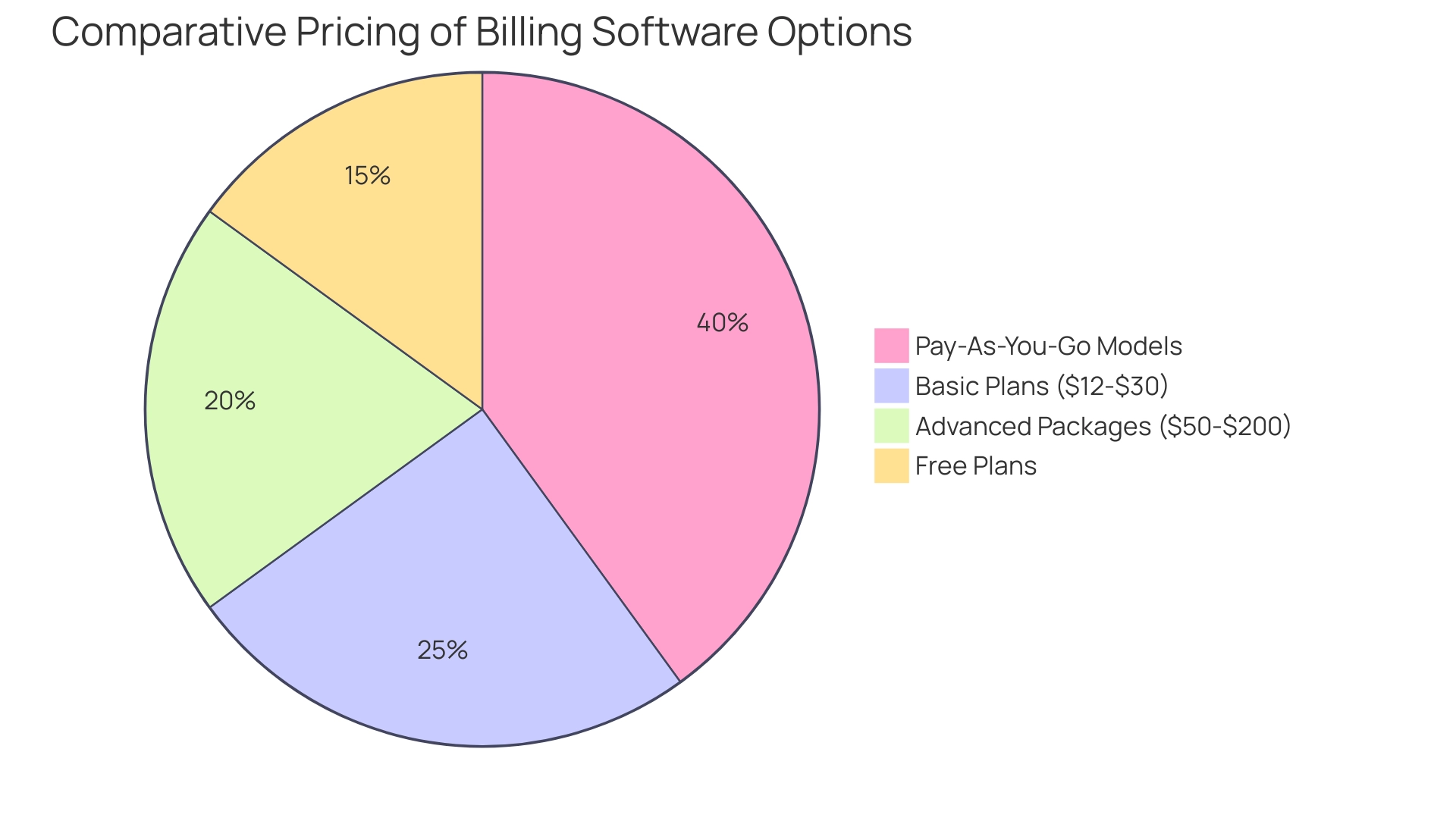
Conclusion
The landscape of billing software for small businesses is continuously evolving, presenting a myriad of options tailored to the varied needs of entrepreneurs. As emphasized throughout this article, selecting the right billing software is crucial for enhancing operational efficiency, improving cash flow management, and alleviating administrative burdens. Solutions like Kulud, FreshBooks, and QuickBooks have emerged as leaders in the field, each offering distinct features that simplify invoicing, expense tracking, and financial oversight.
Choosing the appropriate billing solution transcends mere preference; it significantly impacts a business's financial health and growth potential. In an age where automation is essential, the capacity to streamline processes such as invoicing and payment collection is transformative. The incorporation of automated systems allows business owners to redirect their focus from monotonous administrative tasks to strategic decision-making, thereby fostering an environment that is conducive to growth.
Ultimately, the decision regarding billing software is pivotal and can lay the groundwork for long-term success. As small businesses grapple with increasing financial pressures and the demands of a competitive market, the adoption of effective billing solutions becomes imperative. By utilizing the right tools, entrepreneurs can adeptly navigate their unique challenges, ensuring that they not only survive but thrive in today’s dynamic business environment. The future of financial management for small businesses is promising, and embracing modern billing software is a critical step toward achieving sustainable success.
Frequently Asked Questions
What are billing programs for small businesses?
Billing programs for small businesses are tools designed to simplify invoicing and payment collection processes, addressing the unique requirements of small organizations. They enhance efficiency and improve accuracy in financial transactions, allowing business owners to focus on growth rather than administrative tasks.
How has the invoicing software landscape evolved by 2025?
By 2025, the invoicing software landscape has evolved significantly, offering options ranging from basic invoicing solutions to comprehensive accounting platforms. Many small and medium-sized enterprises still rely on paper records, indicating an opportunity for improvement through digital invoicing solutions.
What are some examples of popular billing software?
Prominent examples of billing software include FreshBooks, QuickBooks, and Zoho Invoice. Each offers distinct functionalities tailored to various aspects of billing and financial management.
What features make FreshBooks suitable for freelancers?
FreshBooks is recognized for its user-friendly interface and robust invoicing features, making it particularly ideal for freelancers and independent entrepreneurs.
How does QuickBooks cater to small businesses?
QuickBooks provides a comprehensive suite of accounting tools that integrate seamlessly with other financial processes, making it suitable for small businesses that require an all-in-one solution.
What advantages does Zoho Invoice offer?
Zoho Invoice stands out for its affordability and customizable features, appealing to startups and smaller enterprises.
What impact do billing programs have on small business efficiency?
Billing programs significantly improve efficiency by automating invoicing and payment collection, reducing the time spent on accounting tasks from hours to just minutes, thus allowing businesses to streamline communication with their accountants.
How does Kulud enhance expense management for freelancers?
Kulud offers features such as automated invoice matching, bank transaction integration, and the ability to easily request missing invoices, enabling freelancers to centralize their financial data and collaborate effectively with accountants and bookkeepers.
Why is selecting the right billing program important for small businesses?
Choosing the appropriate billing program is crucial as it influences financial operations, automates invoicing, tracks payments, and generates essential financial reports, all of which are vital for maintaining healthy cash flow and ensuring timely payments.
What factors should small business owners consider when assessing billing programs?
Owners should prioritize user-friendliness, integration capabilities with existing systems, and the quality of customer support when evaluating billing programs for their businesses.
How does effective financial reporting impact small business decision-making?
Companies with accurate financial reporting are 70% more likely to make effective strategic decisions, highlighting the importance of robust accounting practices.
What is the projected trend for ePayments in small businesses?
ePayments are projected to account for 62% of all enterprise payments in 2024, indicating that small businesses must adapt by selecting billing programs that align with their operational needs.
What do small business owners think about their accountants' advisory services?
61% of small business owners express satisfaction with their accountant's advisory services, indicating a need for billing programs that enhance financial management tools that complement these services.
How can efficient invoicing software transform small business operations?
Efficient invoicing software, like Kulud, can reduce time spent on administrative tasks, promote better collaboration with accountants, and enhance overall operational efficiency, leading to improved financial health and growth potential.



